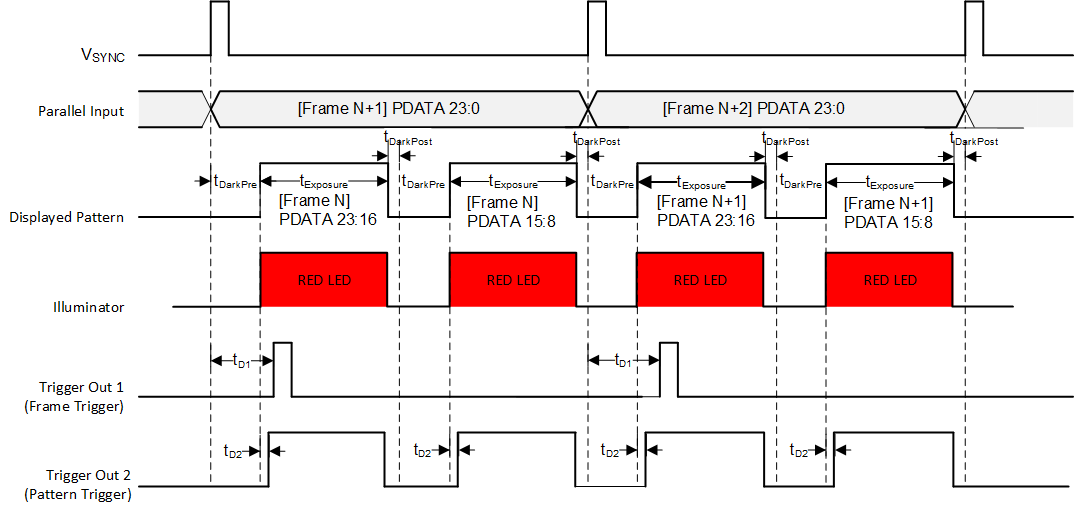JAJSFC5C April 2018 – December 2020 DLPC3470
PRODUCTION DATA
- 1 特長
- 2 アプリケーション
- 3 概要
- 4 Revision History
- 5 Pin Configuration and Functions
-
6 Specifications
- 6.1 Absolute Maximum Ratings
- 6.2 ESD Ratings
- 6.3 Recommended Operating Conditions
- 6.4 Thermal Information
- 6.5 Power Electrical Characteristics
- 6.6 Pin Electrical Characteristics
- 6.7 Internal Pullup and Pulldown Electrical Characteristics
- 6.8 DMD Sub-LVDS Interface Electrical Characteristics
- 6.9 DMD Low-Speed Interface Electrical Characteristics
- 6.10 System Oscillator Timing Requirements
- 6.11 Power Supply and Reset Timing Requirements
- 6.12 Parallel Interface Frame Timing Requirements
- 6.13 Parallel Interface General Timing Requirements
- 6.14 BT656 Interface General Timing Requirements
- 6.15 Flash Interface Timing Requirements
- 6.16 Other Timing Requirements
- 6.17 DMD Sub-LVDS Interface Switching Characteristics
- 6.18 DMD Parking Switching Characteristics
- 6.19 Chipset Component Usage Specification
-
7 Detailed Description
- 7.1 Overview
- 7.2 Functional Block Diagram
- 7.3 Feature Description
- 7.4 Device Functional Modes
- 7.5 Programming
- 8 Application and Implementation
- 9 Power Supply Recommendations
- 10Layout
- 11Device and Documentation Support
- 12Mechanical, Packaging, and Orderable Information
7.3.2.1.1 8-bit Monochrome Patterns
In 8-bit external pattern mode, the DLPC3470 controller supports up to 120-Hz input frame rate (VSYNC). In this mode, the 24-bit input data sent over the parallel interface can be configured as a combination of 1 (8-bits), 2 (16-bits), or 3 (24-bits) 8-bit patterns. Equation 1 calculates the maximum pattern rate for an 8-bit pattern.
Equation 1. 120 Hz × 3 = 360 Hz
where
- the maximum allowed input frame rate is 120 Hz
The DLPC3470 controller firmware allows for the following user programmability.
- Exposure time (tExposure): Time during which a pattern displays and the illumination is on.
- DarkPre time (tDarkPre): Dark time (before the pattern exposure) during which no pattern displays and the illumination is off.
- DarkPost time (tDarkPost): Dark time (after the pattern exposure) during which no pattern displays and the illumination is off.
- Number of 8-bit patterns within a frame: 1, 2, or 3 within each frame period
- Selection of Illuminator that is on for each 8-bit pattern.
- TRIG_OUT_1 and TRIG_OUT_2 signal configuration and delay.
Figure 7-8 shows a configuration with 3 × 8-bit patterns.

tD1 is
the configurable delay for the frame trigger
tD2
is the configurable delay for the sub-frame trigger
Figure 7-8 3 × 8-bit (Blue) Pattern
Configurations- 3 × 8-bit patterns are displayed within each input VSYNC frame period.
- tDarkPre, tExposure and tDarkPostare the same for each pattern within a frame period.
- The sum of dark time and exposure time (tDarkPre + tExposure + tDarkPost) for the three patterns must be equal to or less than the full frame period. If the sum is less than the full frame period, additional dark time will be appended to the end of the last pattern.
- The Blue LED is configured to be on for each pattern.
- TRIG_OUT_1 (Frame Trigger) is configured active high polarity and will have a minimum pulse width of 20 microseconds. TRIG_OUT_1 delay (tD1) is configured with respect to input VSYNC.
- TRIG_OUT_2 (Pattern Trigger) is configured active high polarity and stays active during the pattern exposure . TRIG_OUT_2 delay (tD2) is configured with reference to the start of the pattern and is set once per pattern within a frame.
Figure 7-9 shows a configuration with 2 × 8-bit patterns.
 Figure 7-9 2 × 8-bit (Red) Pattern
Configurations
Figure 7-9 2 × 8-bit (Red) Pattern
Configurations- 2 × 8-bit patterns are displayed within each input VSYNC frame period.
- tDarkPre, tExposure and tDarkPost are the same for each pattern within a frame period.
- The sum of dark time and exposure time (tDarkPre + tExposure + tDarkPost) for the three patterns must be equal to or less than the full frame period. If the sum is less than the full frame period, additional dark time will be appended to the end of the last pattern.
- The Red LED is configured to be ON for each pattern.
- TRIG_OUT_1 (Frame Trigger) is configured active high polarity and will have a minimum pulse width of 20 microseconds. TRIG_OUT_1 delay (tD1) is configured with respect to input VSYNC.
- TRIG_OUT_2 (Pattern Trigger) is configured active high polarity and stays active during the pattern exposure. TRIG_OUT_2 delay (tD2) is configured with reference to the start of the pattern and is set once per pattern within a frame.
Figure 7-10 shows a configuration with 1 × 8-bit patterns.
 Figure 7-10 1 × 8-bit (Green) Pattern
Configurations
Figure 7-10 1 × 8-bit (Green) Pattern
Configurations
- 1 × 8-bit pattern is displayed within each input VSYNC frame period.
- tDarkPre, tExposure and tDarkPost are the same for each pattern within a frame period.
- The sum of dark time and exposure time (tDarkPre + tExposure + tDarkPost) for the three patterns must be equal to or less than the full frame period. If the sum is less than the full frame period, additional dark time will be appended to the end of the last pattern.
- The Green LED is configured to be on for each pattern.
- TRIG_OUT_1 (Frame Trigger) is configured active high polarity and will have a minimum pulse width of 20 microseconds. TRIG_OUT_1 delay (tD1) is configured with respect to input VSYNC.
- TRIG_OUT_2 (Pattern Trigger) is configured active high polarity and stays active during the pattern exposure. TRIG_OUT_2 delay (tD2) is configured with reference to the start of the pattern and is set once per pattern within a frame.